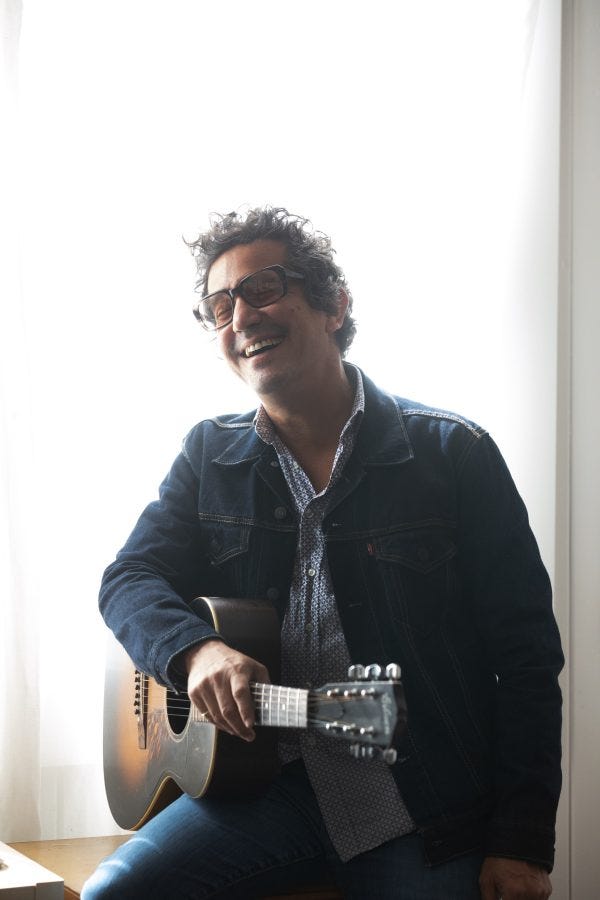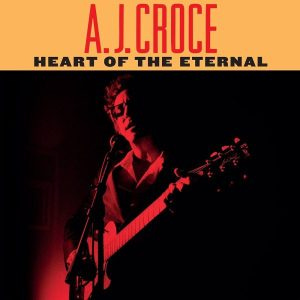By Brian D’Ambrosio
For A.J. Croce, music is both inheritance and discovery, a legacy lived and reshaped on his own terms. The son of the beloved Jim Croce, A.J. has spent decades forging his identity as a musician while navigating the echo of a father whose songs still resonate deeply across generations. Yet, the path hasn’t been about mimicry; it’s been about connection—between past and present, audience and performer, memory and creation.
This year, A.J. released a new album, Heart of the Eternal, featuring the single “Complications of Love,” produced by Shooter Jennings, showcasing a collection of original work written over recent years. Alongside this, he’s embarking on the Croce Plays Croce tour, a project that finally allowed him to embrace his father’s music in performance. “It took 30 years for me to ever play my father’s music,” A.J. said. “I kind of opened Pandora’s box, and it’s been amazing. It’s complicated and emotional, but it’s also joyful and magical every night.”
The tour is far more than a tribute. It’s a living, breathing concert experience where A.J. interweaves his father’s classics with the music that shaped them both. Through live video projections, stories behind the songs, and an expansive repertoire that draws from early jazz, stride piano, blues, soul, and country, A.J. bridges the generations in each performance.
“Everyone starts off covering other people’s music,” he reflected, “and in my dad’s case, there were 10 years of playing all kinds of stuff. That inspired me to make this a multi-layered event.”
Growing up surrounded by music, A.J. absorbed his father’s influences and a wider musical lexicon. His earliest gateway was Ray Charles, whose records opened doors to a lifetime of exploration. A.J. learned to play the piano with ambition, mastering stride, jazz, and New Orleans styles, all while discovering connections that wove through his father’s work and beyond. Collaborations with artists like Alan Toussaint reinforced the continuity of this musical heritage, highlighting unexpected intersections between his father’s early interpretations and contemporary interpretations. Even Merle Haggard, A.J. recalls, was moved when presented with a recording of Jim Croce playing “Mama Tried” decades earlier.
Yet, beyond the music, the Croce legacy is about presence and emotional connection. A.J. speaks to the significance of performing these songs live, how nostalgia transforms into a shared moment in the present. “People come for nostalgia,” he said, “but as soon as I walk on stage, that memory becomes three-dimensional. We’re in the moment together. It’s really unique, and I don’t know that too many people have experienced something like this.” The empathy and attention he brings to his craft allow him to inhabit each song fully, whether he’s adhering closely to the original or improvising freely to make a piece his own.
A.J. also treasures the subtler, sensory memories that connect him to his father. Family recipes, the smells and sounds of Philadelphia streets, and the textures of everyday life are all triggers that link him to moments he never shared with his father in childhood (he wasn’t even two years old when his father died). He recalls walking down South Street in Philadelphia, sensing an old-world continuity that transcends time, grounding him in a personal and cultural lineage. These details—food, streets, sounds—form a tapestry alongside the music, enriching both his performances and his life.
Deep cuts in his father’s catalog hold particular significance. While songs like “Time in a Bottle,” “Operator,” and “Leroy Brown” are universally recognized, A.J. finds meaning in lesser-known pieces that reveal the depth and breadth of Jim Croce’s artistry. Early blues, folk, and jazz selections, often recorded in the 18 months of his father’s professional career, provide insight into the musical foundation that informed his iconic hits. A.J. himself has delved into obscure tracks by artists such as Fat Swaller, John Hurt, Sonny Terry, and Blind Blake, integrating these influences into his own performances. In doing so, he not only honors the lineage but expands the audience’s appreciation for the richness of the original work.
This attention to deep cuts also reflects a broader philosophy about music and life: connection is paramount. A.J.’s set lists are intentionally flexible, shaped by audience requests that reveal the personal significance of songs for listeners. By playing these requests, he engages in a dialogue that emphasizes empathy and mutual discovery. “That’s when I feel connected,” he said. “It’s not just nostalgia. It’s about the emotion and environment created in that moment.”
Themes of closeness and distance recur in A.J.’s reflections, especially regarding family. Loss has been a presence in his life—Jim Croce was 30 when he died in a plane crash in 1973 – and with that absence comes a heightened awareness of connection, even across distance.
Songs like “The Finest Line” from his new album explore the sense of proximity to those who have passed, evoking the feeling that they are still within reach, if only in memory or through the medium of music. It is a delicate balance between grief and gratitude, one that informs both his songwriting and performance.
Through all of this, A.J. Croce has found a way to claim his musical inheritance while asserting his individuality. He navigates the legacy of his father’s work with reverence and creativity, blending nostalgia, improvisation, and historical awareness.
On tour, A.J. brings audiences into this world each night, creating a space where memory, music, and emotion converge. His performances are not mere recreations; they are living conversations with his father, the music that shaped them both, and the listeners who carry that legacy forward. It is, as A.J. describes it, a gift—one that turns nostalgia into immediacy, reverence into joy, and memory into a shared present.
Indeed, A.J. Croce’s journey through his father’s music and his own creative landscape demonstrates that legacy is not only inherited but actively made, every night, on stage, and in the moments that music allows us to feel connected to each other.
For story ideas and suggestions, Brian D’Ambrosio may be reached at dambrosiobrian@hotmail.com



